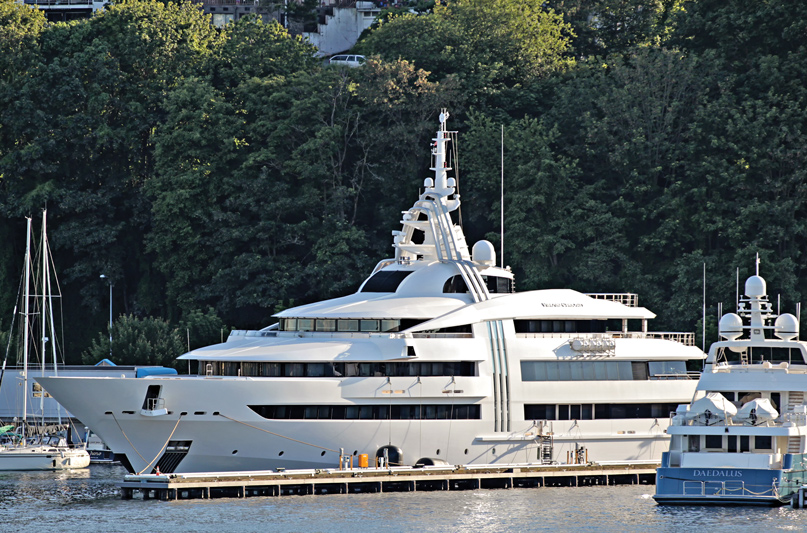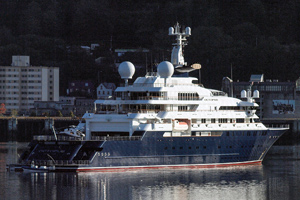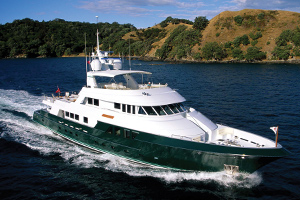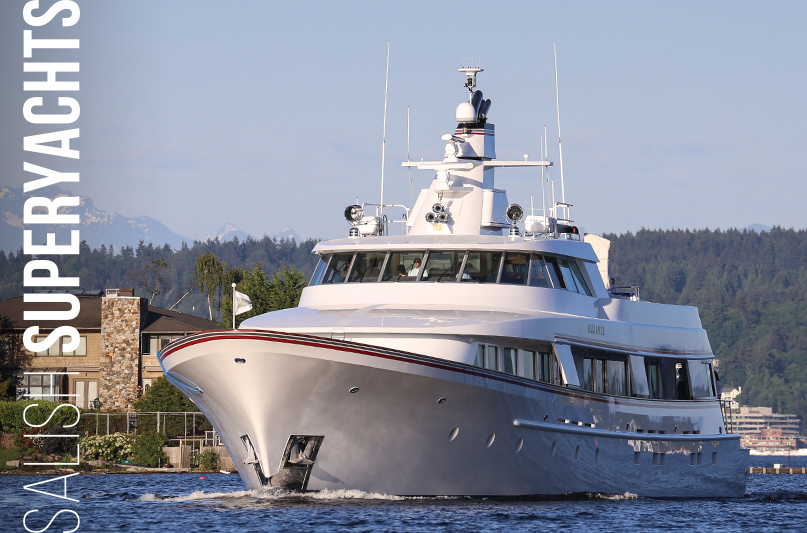
 Like the massive whales that live in and migrate through our waters, super-sized yachts are a part of the nautical tapestry of the area. We dive into why, from the Ice Ages of yore to the local technology investments of the future.
Like the massive whales that live in and migrate through our waters, super-sized yachts are a part of the nautical tapestry of the area. We dive into why, from the Ice Ages of yore to the local technology investments of the future.
Find a good vantage point and you can spy just about every kind of vessel imaginable on the Salish Sea. It’s not inconceivable that you could spot a U.S. Coast Guard cutter escorting a nuclear submarine to the Bangor Navy Base and, in the same casual glance, see the wooden tall ship Adventuress under full sail. In this same tableau, massive container ships from exotic lands plow under the snow-capped Olympic Mountains as Foss or Crowley tugboats heroically shoulder the burden of industrial barges. On the horizon, a mélange of colorful spinnaker kites in a weekend regatta mingle with fishing boats chasing that salmon derby win. Uncle Joe’s 40-foot Bayliner Tax Sea-vation may even be in the mix, but odds are that a jaw-dropping, head-turning, insert-anatomy-inducing superyacht will upstage them all, elegantly parting the seas on her way to high-class horizons.
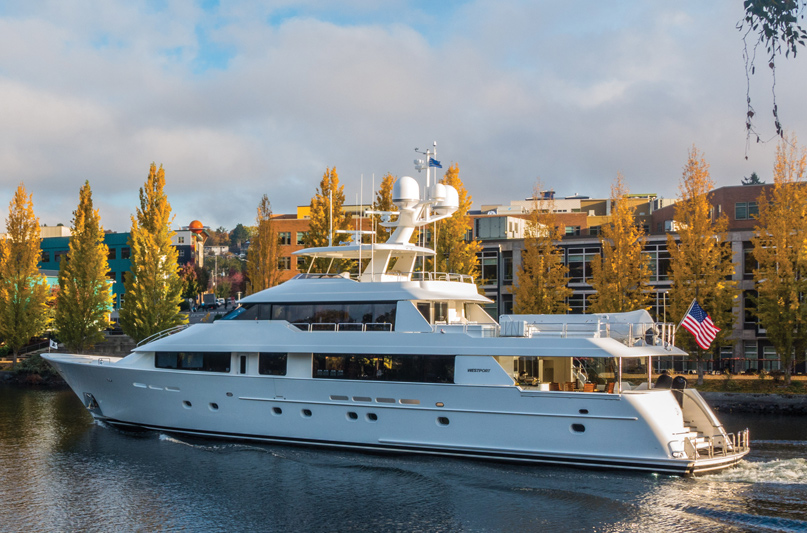
If you do see a superyacht passing by, it could be passing through on its journey up from Mexico or down from Alaska, or it could be a true local that calls these waters homeport. It’s also equally plausible that the superyacht operates as a chartered business or that it sails under the sole discretion of a wealthy owner. Technically defined as any recreational yacht over 24 meters (about 78 feet) with a professional crew aboard, active superyachts (also known as megayachts) are attracted to hotspot areas like the Pacific Northwest.
Several variables, ranging from the geographic gifts of the region to our thriving maritime scene, have conspired to make our waterways friendly for superyachts. Deep waters, excellent infrastructure, skilled technical support, and, most importantly, adventures to be had are all important ingredients for a superyacht paradise. Here in the Pacific Northwest, we check all those boxes.
Chronologically, an early major development of our superyacht scene was the last Ice Age, specifically the final advance and retreat of the Cordilleran Ice Sheet about 17,000 years ago. This epic mass of ice stood about 3,000 feet high upon the point that Seattle currently sits, approximately five Space Needles tall. The advance and retreat of the ice carved the spellbinding twists and turns of our coastline that ensure a lifetime of boating adventures throughout Puget Sound, British Columbia, and Alaska.
The glaciers are also responsible for the sharp relief between our coastal mountain peaks and the deep waters along our shore. Bottom line: where coastal glaciers have dominated, fjords and fjord-like environments tend to form. There is a reason why the coastal Pacific Northwest looks a lot like Norway or parts of New Zealand, also beautiful glacially formed areas ripe for large vessels to explore.
Flash forward several thousand years to the modern era, and the diverse people of the Cascadian coast from the many Native American nations to European and Asiatic immigrants all made entire livelihoods and cultures based around maritime societies and economies. The original local superyachts were the great canoes of Native Americans which, according to the 1920 New York Museum publication of Indian Notes and Monographs: Types of Canoes of Puget Sound, manifested in variously designed vessels that reached lengths of 80 feet.
Later, European settlers also made their livelihoods on the sea, notably the Nordic people in industries like the commercial fishing business. Yacht design became an artform of the area during the last century, notably Ed Monk and today, his son Ed Monk Jr. (original designer of the still-popular Ocean Alexander motoryacht line).
The modern culture of the area is every bit as sea salty as those days of yore, despite what the tech corporation-dominated headlines may tell you. The city of Seattle alone has invested many resources into the marine industry, recently with the innovative Seattle Maritime Academy that opened in 2016. A branch of Seattle Central College, the school is located prominently in Ballard on the water and has a small fleet of vessels that act as classrooms.
Inside the facilities, there’s even a virtual reality wheelhouse simulator. Another education investment includes Core Plus, an initiative to provide manufacturing trade skills and maritime exposure to high school students, a development we’ve covered often in this magazine. The hope is that the success of this program translates to a clear pipeline of skilled maritime workers that are vital for a healthy industry.
Most recently, Washington Gov. Jay Inslee and a network of industry organizations including The Maritime Alliance have advocated for the addition of a Maritime Innovation Center right in the heart of Seattle at Fisherman’s Terminal. The proposed center is part of a multi-layered approach to make the state an international Blue Economy powerhouse. According to the Port of Seattle, the combined annual direct and indirect revenue of the maritime industry in the state is a sizeable $37.8 billion. Combining the area’s traditional maritime strengths with its innovative tech-entrepreneurial spirit makes for a unique scene ripe for the needs of superyachts.
We don’t just host large yachts in these parts; we build them too. Burien, Washington-based shipbuilder Delta Marine has a long portfolio of super-sized vessels. Notable in the superyacht realm is the 236-foot Albatross that underwent sea trials in Everett in 2016 before its delivery to Europe and the Dubai-based Al Futtaim family clients. The 151-foot Daedalus is another Delta Marine darling, commissioned in 1999 and refitted in 2006. She’s owned by The Boeing Company, the aerospace giant synonymous with Washington state. Daedalus made a splash in The Island Packet, a newspaper in Blufton, South Carolina, for being too big to visit the PGA Golf Tour via the Harbour Town Yacht Basin. Clearly, Daedalus missed the deep waters of her native cruising grounds.
There is a certain mystique and mystery about these superyachts in part because clients generally want projects to be private. This year alone, both 53-meter (174-foot) and 64-meter (210-foot) superyacht projects have been sighted in various phases of production at the Delta Marine shipyard, both designed by Jonathan Quinn Barnett of JQB Design. Who are these superyachts for? That’s a question for the nosiest and boatiest of paparazzi.
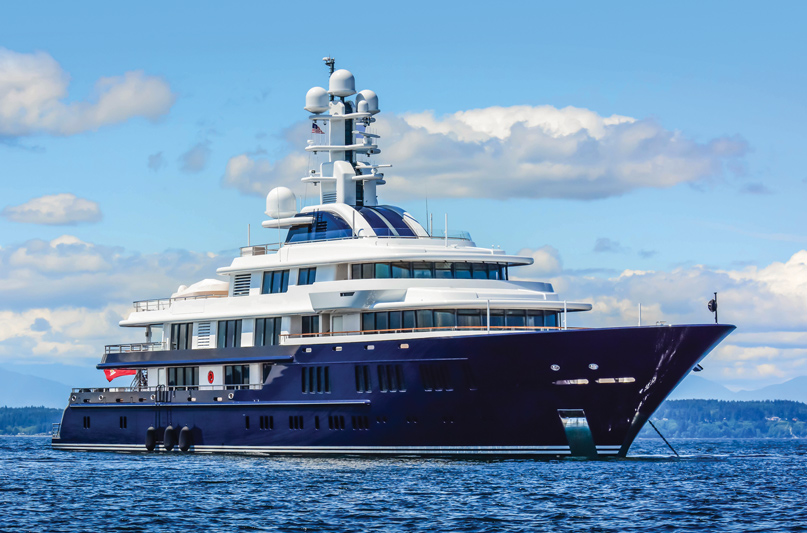
Not only are the details of a superyacht project generally hush-hush, but even more intrigue is triggered by the bespoke nature of each project. The clientele in this tier generally want their dream yacht their way, and a production line yacht usually isn’t feasible. An example of a superyacht pushing the limits of the production model is the Ocean Alexander 100, the largest in-water boat displayed at last year’s Seattle Boat Show. This makes most superyachts one-of-a-kind, a boat nerd’s dream come true.
Another interesting feature of the superyacht parade is its multinational flavor. An example of a superyacht owned by a wealthy recluse that is not for charter is Vibrant Curiosity, an occasional sight in Seattle. Owned by German machine parts billionaire Reinhold Würth, Vibrant Curiosity stretches a commanding 280 feet length overall. She was designed by Nuvolari & Lenard and built by Oceanco in 2009 for a cool $100 million. The superyacht accommodates 14 guests in seven luxury cabins and 26 crew. When Vibrant Curiosity is in town, it docks at Lake Union’s Nautical Landing.
Remove the social and political context, and a superyacht is a pure technological marvel, as close as a mere mortal can have to owning his or her own luxury spaceship and exploring the cosmos. One handy online tool, if you’re curious about the location of your superyacht crush, is vesselfinder.com. This website posts live GPS data via vessel AIS signals from around the world and maps them. The website is also a good way to identify a passing superyacht and sate your curiosity.
Add in the social and political context, and another dimension to the superyacht experience comes into play. Our October 2018 centerfold was of the 439-foot superyacht Serene spotted near Wrangell-St. Elias National Park Preserve of Alaska.
Originally built for Russian vodka tycoon Yuri Shefler for $330 million and previously leased by our own Bill Gates, she truly is a wonder, an awe-inspiring blend of art and science that is one of the top ten largest of her kind. However, Serene is owned by Prince Mohamed bin Salman of Saudi Arabia, currently embroiled in the international controversy for his involvement in the gruesome murder of Washington Post journalist Jamal Khashoggi. Mary, an Anacortes-based reader and boater who wrote to us, had this to say:
…I have been boating in these waters for the last 34 years and do not have room in my life in America for royalty; English, Arabian, or whatever form the empire chooses to adopt. I can picture the miseries propagated by an insane world hooked on oil as its crack—wars, tortures, etc.—so Prince Mohammed can ride around on a boat with its helicopter and show off. Everyone has to move over for the prince. Forget about it!
I appreciate your magazine and allowing me a forum to express my opinion without (yet) being put in jail. I doubt a woman in Saudi Arabia has this kind of freedom.
On an emotional level, what are we to make of that glorious superyacht gliding past? Surely, everyone will feel something different. Those in the marine industry likely see the dozens of maritime professionals with good jobs aboard, in addition to the untold dozens if not hundreds of factory workers, naval designers, marina personnel, and more also earning their living. Those enamored with the lifestyles of the rich and the famous will see celebrity names in lights. Others who simply love the big and bold of the world will admire. Some, like the aforementioned reader, will see excess and even evil.
What will you see? Perhaps, if you look very closely, you’ll see all the above.
